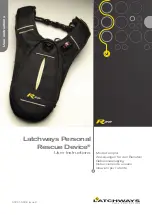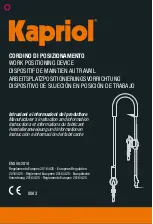
Location
The canister must be mounted inline with the integrated fuel tank vent line. A proper
location in the hull must be identified and dedicated for the installation of the canister.
•
The hose connections to the canister must be accessible for inspection and
service.
•
The canister should not be mounted in a location where it will be stepped on or
otherwise have a force exerted upon it.
•
The canister can be mounted at any orientation from horizontal to vertical
provided that the vent side port is not lower than the tank side port when boat is in
either static floating or trailering position.
•
The vent line before and after the canister must be “self draining”.
•
If mounted in the engine compartment, the canister must have a heat shield (will
be integrated into the canister and sold as one unit).
•
Canister must be mounted higher than the highest point of fuel tank to allow for
proper line draining.
Fasteners
Mount securely with (2) ¼" bolts or #14 screws through each mounting tab hole. Rubber
isolators are provided with each canister to allow for convenient installation.
Vent Line
Secure 5/8" vent hose with a clamp over each port (not included). Secure the vent hose
as needed with hose mounting clamps for proper routing of hose and to ensure there is
not stress on the hose at the connection to the canister.
Integrated System Requirements
Liquid fuel is not permitted to enter the canister. This can be managed by installing an
in-line surge protector vert/- 45° as close to the tank as possible. There must be
no less than 24" of hose between the inline surge and the canister all of which must be
self draining to the tank.
Liquid water must not enter the canister from the exterior of the vessel. This can be
managed by installing a P-trap or similar device at the vent hardware mounted to the hull.
Ullage must be designed into the integrated tank to allow a minimum of 5% of the tanks
total volume to remain unfilled with fuel. This allows for the safe expansion of the fuel
during a system increase in temperature.
© Copyright 2008, Attwood Corporation. Lowell, MI.



















